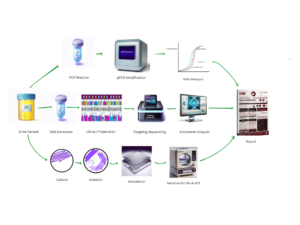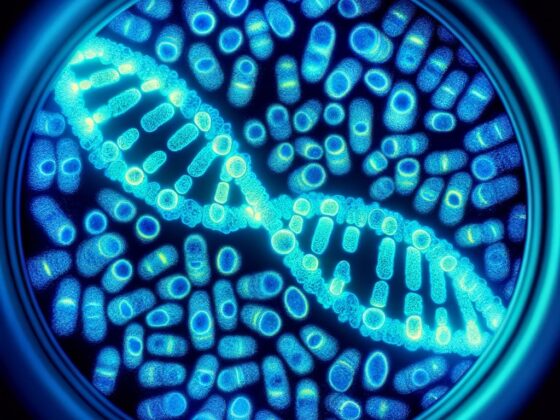Urinary Tract Infections (UTIs) – Importance of quick and correct diagnosis
Urinary Tract Infections (UTIs) are a significant source of discomfort, pain, and potentially severe complications for nearly 150 million people annually. The stakes are high, not just for the individual’s health but also for the healthcare system dealing with the costs associated with UTIs. With antibiotics being the most transcribed treatment, suspected UTI is one of the most common causes of inappropriate antibiotic prescribing in inpatient settings. This is why it is crucial to identify the type of UTI quickly and effectively. Traditionally, urine cultures have been the gold standard for diagnosing UTIs. However, there are a number of drawbacks to these tests, which begs to question how suitable it is for UTI diagnosis. In recent years, the spotlight has turned towards innovative solutions like Polymerase Chain Reaction (PCR) urine testing.
Click here to for our Requisition Form
What is PCR?
Polymerase Chain Reaction (PCR) is a technique that amplifies small DNA segments into millions of copies, enabling detailed analysis from minimal samples.
It involves:
- denaturation – heating DNA to separate strands
- annealing – binding primers to DNA
- elongation – extending new DNA strands
Essential in medical diagnostics, forensic science, and research, PCR detects pathogens, identifies genetic mutations, and analyzes DNA in detailed studies. PCR’s ability to provide rapid, accurate genetic analysis has revolutionized the biological sciences, making it a fundamental tool in diagnosing diseases, solving crimes, and advancing genetic research.

PCR vs Culture tests
Precision
Unlike urine culture methods, PCR does not rely on bacterial growth, enabling the identification of bacteria directly from the sample. It allows for even the tiniest quantities of pathogenic DNA to be detected. This capability is crucial, especially when UTIs present with low bacterial concentrations that urine culture tests often miss. The PCR test’s ability to expedite diagnosis promises a swift intervention and treatment, potentially reducing the duration of discomfort and preventing the progression to more serious conditions.
Speed
The speed and precision of diagnostics is crucial when it comes to UTIs. Delayed treatment can lead to kidney infections, sepsis, and other complications. Standard urine culture tests are time consuming and take a minimum of two days to receive a result. Not only does this delay increase the patient’s distress, but also the risk of nosocomial infections due to prolonged inpatient treatment. By contrast, PCR delivers results within a matter of days.
Specificity
Urine cultures are often unreliable when it comes to certain uropathogens (such as gram-positive bacteria, Enterococci and Group B streptococci), which they are less likely to detect. Moreover, when a UTI is caused by atypical organisms as seen in neutropenia, genitourinary tuberculosis, and urinary tract abnormalities, it requires the use of augmented culture methods and diagnostic tests, which vary by microorganism. PCR is extremely sensitive and is able to detect such organisms with higher accuracy. This is extremely beneficial since 30-39% of UTIs are polymicrobial and their treatment is entirely dependent on correct diagnosis.
Screen for multiple pathogens simultaneously
Furthermore, PCR’s capacity for comprehensive screening through multiplexing allows for the simultaneous screening of multiple pathogens, providing a holistic view of the infection. Perhaps most critically, PCR plays a pivotal role in antibiotic stewardship by detecting resistance genes, thereby enabling targeted treatment and combating the global health threat of antibiotic resistance.
Limitations of PCR
While it is a newer and more refined technique, PCR urine testing is not flawless, and it is important to note its limitations. Even though it excels in detecting the DNA of pathogens, it does not provide information on the viability of these organisms. Additionally, PCR tests are more expensive and depend on the capabilities of laboratories to perform them. They are limited to the pathogens included in their programmed panel and do not currently offer insight into the sensitivity of detected pathogens to specific treatments.
Future of PCR
However, the future of PCR in UTI diagnostics looks very promising. As technology advances, so too will the capabilities of PCR testing, making it even more versatile and precise. The potential for PCR to offer a more complete picture of antibiotic resistance, coupled with the reduction in costs and increased accessibility to necessary technology, suggests that PCR urine testing could play an increasingly significant role in diagnosing UTIs and other infectious diseases.
Conclusion
The introduction of PCR urine testing represents a pivotal advancement in the diagnosis of UTIs. By offering rapid, sensitive, and specific detection of pathogens, PCR testing promises to improve patient outcomes through timely and tailored treatments. Its superiority over traditional diagnostic methods in terms of speed and sensitivity not only redefines the standards of care but also builds trust between patients and medical professionals. As we move forward, the continued adoption of PCR testing in healthcare settings will undoubtedly enhance our ability to effectively address and manage UTIs, ultimately benefiting both patients and the healthcare system as a whole.

